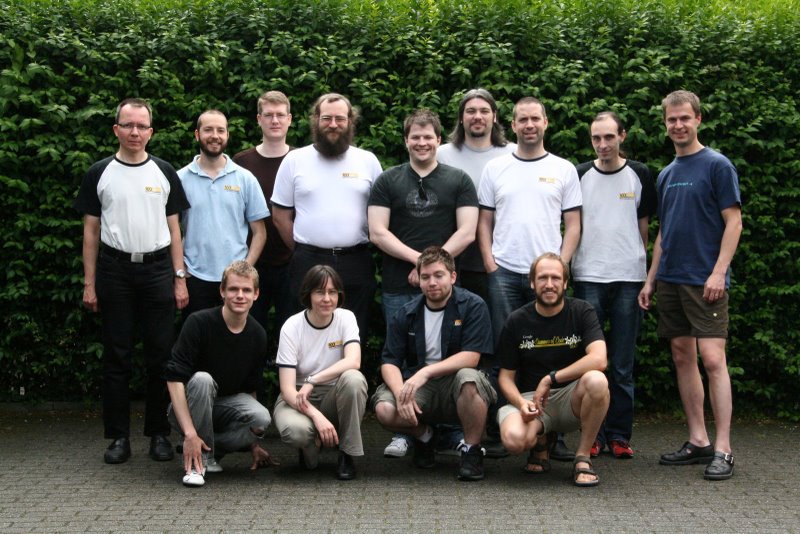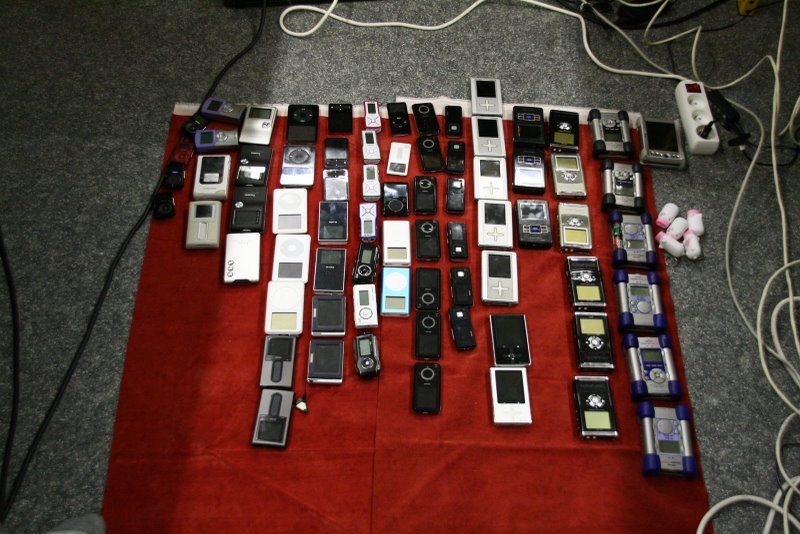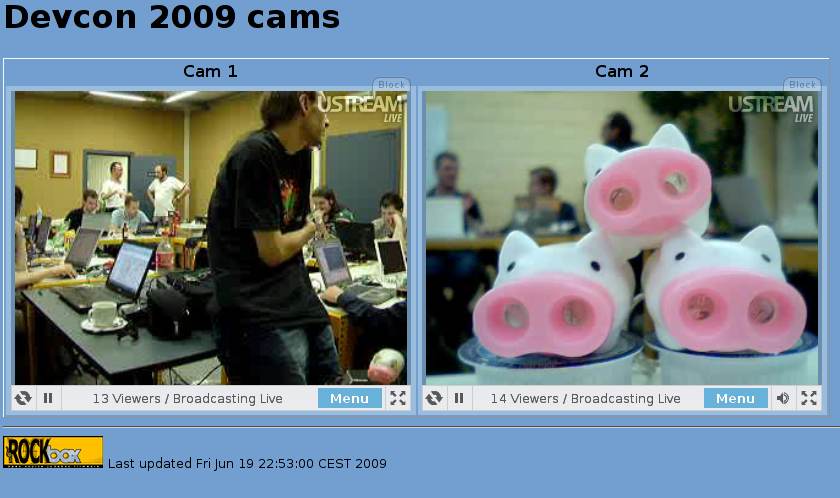I’m scheduled to do a talk about libssh2 on the Slackathon 2009 meeting at Stockholm University, August 15th 2009. The talk will be held in English. See you!
Category Archives: Open Source
Open Source, Free Software, and similar
I host www.libssh2.org
Sara Golemon, the founder and former maintainer of libssh2, pointed over the main site www.libssh2.org to my server the other day and now my previously unofficial libssh2 web site suddenly turned out to be the only and official one.
The plan is now to get the web contents push into a separate git repo to allow all libssh2’ers to modify it.
I’m also open and interested in feedback and ideas on how to improve the web site in whatever kind of way you think. Consider the current site mostly a placeholder for the info we have. How can we make it better?
My HTC Magic Review
This is my first “smartphone” I’ve owned myself so of course I have nothing else this fancy to actually compare against. I’ve played around with others’ a few times but that doesn’t really count. I’ve owned perhaps 8 mobile phones since I got my first one 1996, and they have all been Nokias and Sony Ericssons.
I was never really interested in iPhone due to many reasons. It is not open. It has a (very) restricted app distribution mechanism. It forbids apps from running simultaneously etc. And it has a pretty strong connection with itunes with no proper mass-storage syncing supported. But I admit that it has a slick UI and many cool apps.
My plan is to get some Android hacking going eventually and this is basically the first Android phone that has reached Swedish soil. I mean without requiring me to bend over backwards to get it, as I’m sure I could’ve bought previous Android phones from obroad if I really wanted to.
Random good things:
- it’s fast, most things run faster than on my previous Sony Ericsson thing and yet this is way more advanced with much bigger screen estate and fancier UI
- it has a nice gui that you mostly can guess how to work with
- I love being able to use a qwerty-style keyboard when messaging instead of relying on T9 etc
- wifi is fun, but with a decent data plan it basically only brings me slightly improved speed and I often can’t even tell the difference!
- the integration with the Google services are nice, gmail and maps most noticeably
- there really are a bunch of existing cool apps (I know iphone has lots more, but there are still thousands)
- it has a much better approach to messaging, similar to what I’ve seen in the iphone, than I’ve ever experienced in a Nokia or Sony Ericsson. It focuses on conversations and keeps the “thread”.

- I really really like the feeling of it being a networked thing that also can make phone calls. I can browse, use maps, use gmail just as easily as I can message or call people. With my previous phones all the internet-related services always felt tacked on like a very late afterthought.
- The notification system is nice, and the three-screen wide “home” with its widget-system is really neat.
Bad stuff:
- I’ve had some apps crash on me on occasion. But it’s rarely a problem as they’re restarted automatically for me.
- Toggling wifi on/off a lot can sometimes lead to me not getting any data network at all, and I’ve had to reboot the phone to get back to phone-based (Edge/3G) data.
On-screen keyboard
Of course any and all geek friend I have ask me about how I deal with the on-screen keyboard. I must admit I’m still quite fond of it. Mostly because a physical keyboard makes the phone clonky and it adds physical contraints and wear-points that I don’t like. So the keyboard is a bit small, especially when the phone is in portrait mode, but the suggested completions are fine and I believe I’m already typing pretty quickly on the thing. When I ssh’ed from the phone to one of my servers I did find the obvious lack of cursor keys (to for example navigate an ordinary ncurses-based app or the command line history of a bash prompt) but other than that I really can’t complain.
Background Applications
One obvious advantage compared to iphones is of course the ability to run applications exactly the way I’d like. I can actually run the irc client and then have it in the background while I go browse the web or answer a call or whatever and then at my choice go back to the still connected irc client. In fact when playing with this it feels like a really ridiculous restriction of the iphone.
Comparing to my SE w550i
My previous phone is 94 grams compared to the Magic’s 116. The magic has a much bigger screen. The magic is roughly 11mm wider and 14mm taller. That makes it use 30% more volume (85 cm2) but still fits fine in the front pocket of any set of pants I use. The magic claims a lot longer battery life, but given that it has so much functionality I can’t help to play with all the time I doubt it’ll notice. It’ll more likely run down fast simply because I’ll use it more.
I’m also pleased that there’s no problem to just plug in the Magic to my Linux desktop and copy/sync the photos and the videos etc.
Google Integration
I realize some people will feel that the very tight integration with Google and Google’s services is a downside as it adds just another item that Google “owns” in your life. Still, it makes the experience very slick and as a user I get a lot of stuff “for free” as it just connects to lots of things that I already used and had accounts on. So gmail, sharing photos on picasaweb etc “just works”.
Decrypting ipods
Recently we’ve seen progress by the linux4nano guys in their quest to get custom code to run on an Ipod Nano 2nd generation. They’ve apparently managed to extract the bootrom off a 2nd gen ipod nano (my copy of their extracted data is here – a reminder on objdump usage: “arm-elf-objdump -D --target binary -marm [file]“). I believe their intent is to port Linux to the newer ipods. Possibly ipodlinux. They do mention providing the necessary info to Rockbox and yes we will welcome it.
A large crowd of Rockbox hackers have joined their IRC channel and have been hanging out with them and helped out discussing ideas and pushed them towards publishing their news and infos on how this all is accomplished etc. Their SVN repo hosts some (most?) of the tools made so far.
The Rockbox wiki page for nano2g has been updated and hopefully it will keep track of what happens.
There have been speculations, but I don’t yet know based on what facts, that this recent news and hacks will be usable on other recent (encrypted) ipod models.
Summary: very interesting progress has been made. Lots of it is still left to figure out. There seems to be a bunch of skilled people around and now we’re seeing information and documentation for this getting published so I can’t but to hope for a bright future!
Concepts of a new distributed build
It was time to make an overhaul of our distributed builds system for Rockbox. The one currently in place is quite fancy and it does build 106 builds in around 7-8 minutes, but during the years it has served us we have found a few areas where we want to improve.
The goals for the new system were primarily:
- do all the builds faster
- reverse the connection so that people can contribute clients easier
- make a system that is more allowing for slower machines to contribute
The biggest weaknesses of the existing system:
- The master uses ssh to the distributed clients, which forces them to have an accessible ssh server and port etc. It also makes it awkward for people behind NATs who wants to run more clients.
- It only hands out a particular build to one client, so thus if a large build happens to get handed to a slow client towards the end of a build round, all the other clients will sit idle waiting for the last client to finish.
- The build and the subsequent upload of results to the master are synchronous, so thus a client with a very slow uplink may spend a significant time on the upload before it can start the next build.
The new system is currently in development. It consists of a server that runs on one of our main servers, and there’s a client script that each volunteer contributor runs on their systems.
The clients connect to the master on a dedicated TCP port, specifying user name, password, name of the particular client instance, what particular architectures the client can build and how many bogomips the client boasts. While bogomips is a bogus way to measure anything, we’ve started out using it for a rough way to sort the the build clients based on speed.
The clients keep connected to the server all the time. There’s a ping message from the master every N second of idleness to make sure the connection is kept alive. As soon as the master wants the client to do a build, it sends a message to it detailing exactly how it should build it and using what SVN revision. The client will then do the build at once, upload the results using HTTP to a dedicated place and then tell the server the build is complete.
The server knows about all builds to do at a commit, what we call a build round. It has a rough “score” or “weight” for each build that grades them in a slow to fast order. When a build round starts, the server will first sort all builds based on number of times they’ve been handed out and as secondary sort key the “weight” of it. Then it loops over the currently connected build clients and hand out builds from the sorted build table. The server then continues to do that until all clients have three builds each to build. As soon as a build is reported to have been completed by a client, that client will get the next build from the sorted build list.
If a client connects to the server and the server deems the client to be too old (since it does specify its version in the handshake message), it will be told to update to a specific version instead and come back then. This way the server can update all build clients when important things are fixed.
The clients will soon start to get assigned builds that already have been assigned to another client. This is not a problem but in fact our intention. The client that completes the build first will simply tell the server, and the server will then tell all the other clients that build that same build that they should cancel that particular build.
A client that joins the server in the middle of a build round will simply get a bunch of builds immediately and join in. A client that disconnects during a build round simply won’t complete its builds and other clients will instead do them. The system is also tolerant against the fact that bogomips is lame to compare computers with, and that the build “score” may not be very accurate or even that some server will have very slow or very fast upload speeds at unpredictable times.
The build master itself does not know when to start a new build round. It simply knows about the concept and it knows how to tell clients to complete a round. To make the master to start a new round, you need to connect to the server’s listening port and issue a special command and provide a password and then you can tell the server to start a build of a specific SVN revision. Or to queue up a build to be performed after the current one if there happens to be one in progress already.
When a full build round is complete, a hundred or so builds have been done, and full packages and log files are now in a directory on the build server, the server will simply trigger an external script that then takes care of updating our build table etc. In fact, every single completed build will optionally trigger an external script to allow web pages or stats pages to get updated as we go.
This build system is currently pretty Rockbox-specific as this is the project and development system we’re writing this for, but there’s really nothing in this that must be this way. I’m sure that if someone (you?) wants to adapt this for another project, I’d be more than happy to assist and to help ensuring that this becomes a more generic distributed build system. Just raise your hand and step forward!
At the time of this writing, (primarily) me and Björn are still ironing out quirks in this new system to hopefully get it going live real soon…
Summer 2009
Summer time is here in Sweden.
Those of you who keep up with projects I’m involved in, or if you simple read my blog or follow me on twitter, might notice a slight decrease in activity during July or so when I’m going to have vacation and most probably not be at home during a few weeks.
Rockbox Devcon 2009 Summary
The Rockbox team that gathered in Ghent for this weekend of talk, hacking and socializing (drinking beer) is caught on this group picture. Click the image for a slightly larger version. Photo by Petur.
The people on the photo
The top line from the left: amiconn, markun, bertrik, gevaerts, GodEater, AlexP, Zagor, domonoky, Bagder (me!)
The lower line from the left: kugel, pixelma, scorche, petur
We did have a 2-hour discussion session on the saturday, and I expect to post an mp3 of it later on. The short and compressed outcome in plain text is found here. Petur was a great host. The facilities were nice, the hotel was great, the food arrangements worked out perfectly. A swell weekend!
As our tradition demands, we did bring out all our targets (portable music devices that can run Rockbox or at least have some code in the Rockbox repo) to be used as building bricks to create a Tower of Rockbox.
This first picture shows that we have a pretty wide selection of players in this room:
With all those “bricks” put in an imaginative order on top of each other, the result could look something like this:
you may enjoy comparing this building with last year’s creation.
More pictures from this year can be found in Petur’s collection and gevaerts’ collection.
Rockbox Devcon 2009 in Ghent
In company facilities in the city of Ghent, Belgium, a fine crowd of Rockbox hackers have gathered to hack, chat, drink beer and design new stuff. Rockbox Devcon 2009 is in progress.
This year we’re entertaining the inhabitants of #rockbox and #rockbox-community with two webcam streams from ustream.tv. View both cams at once using rasher’s page.
libssh2 vs libssh
There are only two open source libraries for SSH that I am aware of. At least that are at the fundamental layer, written in C.
I researched the SSH library market years ago when I stuck with libssh2 as the one I thought was most promising, and since then I and others have taken it much further. The lib that I didn’t go with at that time, confusingly enough named libssh, recently came out with a new release.
Since there is now clearly two active open source SSH libraries it feels like we should help our users and potential newcomers by explaining how our projects and libraries differ. As a little teaser: one of the libraries turned out more than twice as fast as the other in my test…
While I admit to not having actually used libssh for real, I’ve read the docs and I’ve tried it a little bit. My take at a comparison is now online at:
http://www.libssh2.org/libssh2-vs-libssh.html
I will highly appreciate your feedback and additional things that differ between the two! The list isn’t really much to boast about as it currently looks!
Kernels on those phones
So Google says there could be 18 phones running Android by the end of this year. In Sweden we just days ago got HTC Magic, the first ever Android phone showing up here (tied to a ridiculous operator deal that makes me and lots of my friends not go that route). Then Palm shipped their Palm Pre just days ago, also based on Linux.
This has brought the interesting questions: how is the state of these kernel  ports in regards to the mainline Linux tree? They’re both using ARM cores (of course).
ports in regards to the mainline Linux tree? They’re both using ARM cores (of course).
The ARM kernel maintainer Russell King himself is not impressed. Apparently Google hasn’t even tried to push their work upstream to the kernel in a long while. The tone in that discussion did make it sound as if they might be starting to work on this again now.
The Palm guys apparently haven’t even yet shown any code at all, but is said to be releasing their code within two weeks to opensource.palm.com. They have not even tried to push their work upstream, so I figure they’re either not even going to bother or they are facing a rather steep uphill battle in the future.






